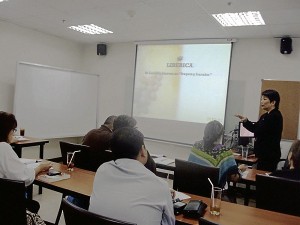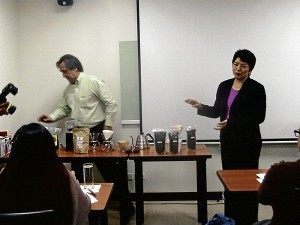Learning the coffee shop business
It was a little less than 20 years ago when I first signed up for a Coffee Education course in Caffe D’Arte in Seattle.
It was the first time I held green beans in my hands, knew the difference between Arabica and Robusta, and learned the difference between an espresso and a macchiato.
Three years before that, I could not drink espresso (in Italy) and found it so aggressive or intense. And I thought it was too much money for 1.5 ounces of coffee (then, it was 1000 lire if you remained standing to 2000 lire if you had a table (“Tavolo” or a view) and a chair).
I preferred brewed coffee, drip coffee, and still prefer it to this day. Espresso, in its small quantity of 1.5 ounces, is good for those long meetings because you take in less liquid and therefore will not need to heed the call of Nature too soon.
This month, I am giving my second annual class at Enderun Colleges Extension Courses on “Coffee 101” and “How to Put up a coffee shop”. Today, I am the one passing green beans and roasted beans around the class, letting them smell the aroma of freshly-roasted coffee, showing them different grinds of coffee and various types of coffeemakers.
My colleague, Manny Torrejon, because of his more than 25 years in the coffee trade, is giving the class on Cupping and Roasting on Oct. 27.
When I started in the coffee shop business, there were no local books on coffee. There also was not much on the Internet yet. So we published our coffee books starting with “KAPE: A Coffee Cookbook” in 2002 and “Barako: The Big Bean” in 2005. After observing that college kids photocopied most of our two books, my publisher encouraged me to write a textbook, which I co-wrote with Reena Francisco, our foodie partner and coffee recipe expert. The textbook was called Introduction to Coffee and was published in 2007.
The most active part of coffee education is an actual encounter with the tree, the fruits and the beans. There also were no coffee tours in 1999, so we started tours to Cavite, Batangas and even to Benguet.
The Philippine Coffee Board Inc. being a non-stock, non-profit largely depends on its trustees to do the spade work for these coffee education activities. We also enjoy being in touch with farmers, coffee enthusiasts and would-be coffee farmers or weekend farmers.
But we continue the advocacy because when you look at the value chain of coffee, there are numerous business opportunities in each part of the chain. Many of the youth, however, choose the coffee shop trade. And this is why we continue to give classes on Basics of Coffee and How to Get into the Coffee Business.
This month, being Coffee Month, we have served thousands of free cups of coffee at the COFFEE ORIGINS 2012 which ends today, Oct. 14.
Later, we will concentrate on helping people find their niche in the coffee value chain.
The Enderun Courses will be on Oct 20 and 27. Email admin.pcbi@gmail.com or call 0917-8811217 or 8565000 and look for Florence Elumba.


